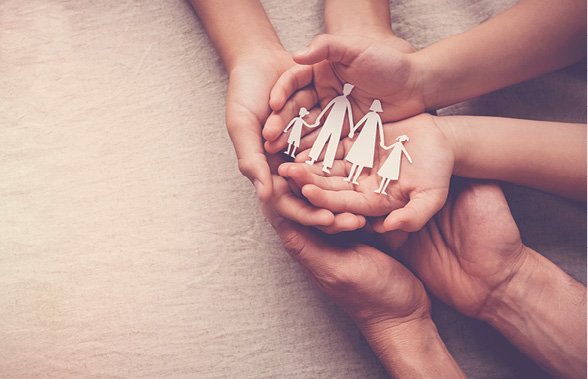Grieving after the death
Even when a person is expected to die, it can still feel like a shock when death happens. Knowing that something will happen does not mean that you can prepare for how it will feel.

When a child dies, some parents have profound questions about life, faith, justice, as well as their roles, identity and purpose. These are huge issues to wrestle with over time.
Try to find someone you can talk with, who can listen without judging or problem-solving. This might be a close friend or family member, another parent who’s had a similar experience, a support group, an online community, a counsellor, or therapist. Ask a member of your child’s health care team to connect you with someone.
“Initially Ella would talk about her brother all the time. She could tell you colour of popsicle they ate together. But because she is so young, there are not a lot of things she specifically remembers anymore.” – Danielle, mother of Keaton
Resources
- MyGrief.ca - Canadian Virtual Hospice
There is no right or wrong way to deal with it or to work through grief. I went back to working fulltime. I know people were worried I was throwing myself in work to distract myself, but it was good for my soul to do that. The textbooks would say I was in denial but the reality is, it was actually what I needed to start to recover. Eight months later I needed a break, and I made space to do more grieving again.” – Esther, mother of Elianna and Eli-Grace
We now know that people don’t “move on” or “get over” the death of someone close to them but instead, they “move through” grief to a new way of living.
It can be very helpful and healthy to keep a connection with your child. You can talk to them or write to them, do things for them, or in their honour, keep special belongings, or hold onto the feeling of their presence. Do what feels right for you.
It may feel like your “normal life” is gone forever. As you move through your grief, you may find it helpful to do things that used to feel “normal” or you may build a “new normal”. Set up new routines and talk to people who understand what you’re going through. There is no right or wrong thing to do. It’s important to do what feels most comfortable for you. Remember that grief changes a lot over time, and the way you live with grief will change too. Make plans or routines that will work “for now” and change them as often as you need to.
Moving through grief causes many mixed feelings. You may feel a new wave of grief when you:
- Do something you didn’t have the time or energy to do when your child was alive
- Do something you used to do, or wanted to do with your child
- Feel a little bit better, even for a moment
These waves of grief may happen not only in the first year after your child dies, but for many years after. Try to be gentle with yourself. Moving forward through your grief doesn’t mean you are forgetting about your child. Feeling a little better doesn’t mean you don’t care.
“Tyler’s younger brother was 12 and in grade 7. Robert did go back to school quickly because they were having the public school soccer tournaments the following week. He went to school part days for about three weeks before returning full time. His school Principal promised that they would surround him with love while he was there. Robert plays competitive soccer and says “When I’m having a good day, I kick a ball and when I’m having a bad day, I kick a ball.” Soccer has been and continues to be a good outlet for him.” – Darren, Father of Tyler












